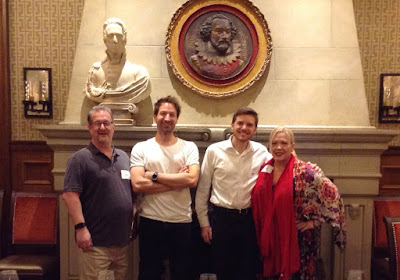In what could be a game changer for the music publishing community, Spotify has opened up its data to music publishers, providing tools that were previously only available to record labels. The music streaming platform said the Spotify Publishing Analytics plan is "the first analytics tool from a music streaming service built specifically for publishers, so they can better serve their songwriters."
Spotify put together a roadshow to inform publishers of the new
analytics policy, stopping mid-November at an event in Beverly Hills,
hosted by the LA Chapter of the Association of Independent Music Publishers (AIMP). Spotify executives included Chris Crawford (Publishing Relations & Services, US), Jules Parker (Publishing Relations & Services, EMEA and APAC) and Adam Parness, Global Head of Publisher Licensing.
“We want to make it work for creators and we are building tools that you can use," said Parker to a room packed of music publishers. He added that it was about setting up a partnership between the streaming service and publishers.
Spotify started a few months ago to make song credits with the names of songwriters available to users. Crawford explained that this was the first step in providing more visibility to the publishing side of the music business. The next step was to "empower publishers" by providing new tools such as the possibility for publishers to create account with Spotify and access analytics pertaining to their repertoire through a dashboard and engage with listeners by creating specific playlists.
Providing the same tools as labels
"We want publishers to have the same tools as labels," said Parker. Spotify Publishing Analytics will give publishers daily streaming statistics for the works and recordings they have identified, including playlist performance, as well as the ability to view data for each of the songwriters on their roster, explained Parker.
Crawford added that access to analytics could help publishers make better informed decisions with regards to marketing and promotional activity regarding their repertoire, while also being able to do predictive royalty planning. "These are purely analytics, and have nothing to do with royalty payments, but we want to give you results as we have them, in real time," said Crawford. "It is not a claiming portal."
Parness said these developments are part of Spotify's strategy to be "more creative-focused." He added, "The idea is to enable publishers to better serve their songwriters and help [them] make better business decisions."
During a Q&A with the audience, Parness was asked if Spotify planned to increase the royalty rates for songwriters and publishers. Parness said that Spotify was "taking a real look at growing the royalty pot for publishers and songwriters," but that will be through the overall growth of the streaming platform. "We want to grow the business and the pot of royalties," he said.
Better business decisions
Spotify's initiative has been positively received by a wide range of publishers. In a statement, Rich Scott DePerto, Director of Royalties & Copyright Administration at New York-based indie publisher Reservoir claimed that "access to daily global analytics for the leading DSP allows us to better track our catalogue’s performance and gives us valuable insight that we can use to make more informed business decisions in supporting our songwriters.”
Patrick Joest, EVP Global Content Partnerships & Synch, at BMG concurred: “Armed with this level of streaming data, directly from Spotify, music publishers can gain insights into new opportunities for their songwriters, more efficiently collect royalties on their behalf, and more effectively market their works.”
 |
| From
l-r: Michael Eames of PEN Music Group and AIMP LA, Jules Parker of Spotify, Chris Crawford of Spotify, Teri Nelson-Carpenter of Reel Muzik Werks and AIMP LA |

